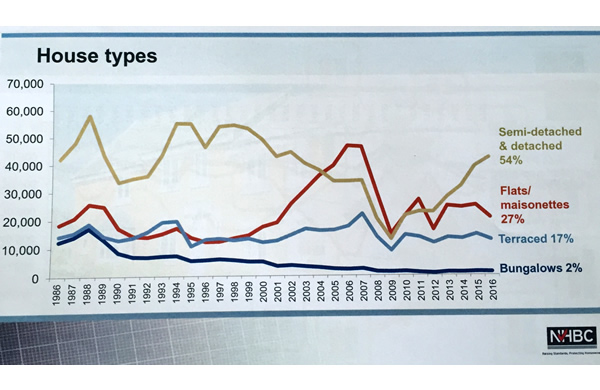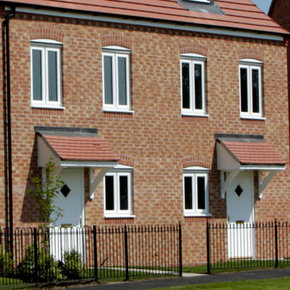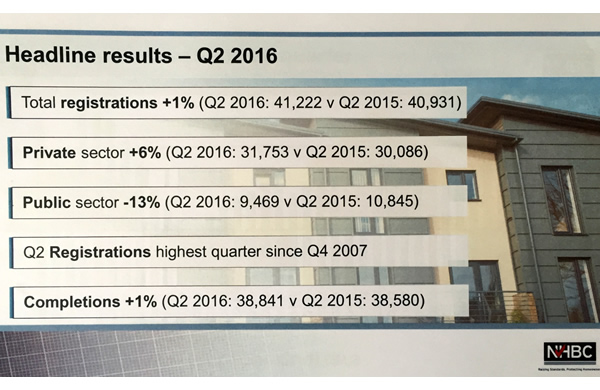
New home growth is not enough to meet UK needs
Howard Chapman looks at the latest NHBC new home registration statistics, which show some growth but no real solution to the chronic long-term under-supply of new homes across the UK.
NHBC is a warranty and insurance provider for new homes in the UK. Its ten-year Buildmark warranty covers around 80 per cent of new homes built in the UK.
NHBC’s new home registration statistics, which refer to the process of a builder registering a home to be built in the coming weeks or months, are a good indicator of UK house-building activity and trends.
The statistics suggest that the industry is continuing to consolidate on the strong growth in registrations seen over recent years. The NHBC’s Chief Executive, Mike Quinton, argues that these registrations reflect ‘continued industry confidence in the run-up to the EU Referendum’, which took place at the end of June.
‘This period was the strongest quarter since Q4 2007, albeit still somewhere off the levels seen over a decade ago,’ comments Mike.
Home registration results
The statistics show a 6% increase in registrations within the private sector from July 2015 to July 2016. However, the public and affordable housing sector is down 13% on a year ago, with only 9,469 registrations recorded.
Overall, the statistics show 41,222 registrations. Despite the drop within the public and affordable sector, the figures are up 1% on a year ago; it is the strongest quarter since 2007.
However, there were mixed results across the UK. Whilst half its regions showed an increase in registrations – the South East is up 37% and the North East 34% – the other half experienced a drop. Wales, for instance, is down 30%; London 29%.
The statistics also suggest a shift away from starter homes to more expensive and profitable semi-detached and detached homes. These account for 54% of all homes registered to be built, overtaking affordable flats and maisonettes at just 27% and terrace housing at 17%.
Decrease in affordable new builds
Overall, the new house building registrations are up by a small margin, remaining strong despite the concerns prior to the EU Referendum. However, this is overshadowed by the 13% drop in public and affordable new home build registrations.
The private sector continues to grow strongly, having doubled since the 2008 downturn, but this growth is still short of providing an answer to the chronic long term undersupply of new homes.
John Stewart, the Director of Economic Affairs at the Home Builders Federation, has argued that the 250k homes target for the next 4 years is not happening, and will not happen unless there is a paradigm shift in how we build homes.
At the NHBC briefing, he suggested that Brexit will, unfortunately, result in slower growth and exacerbate the problem.
 A paradigm shift in house building
A paradigm shift in house building
In my view, building new homes on a scale that would meet the needs the growing population would be economically beneficial. We would need to address the problems of skilled and non-skilled labour shortages but, this aside, balancing the housing infrastructure would provide a wide based economic stimulus.
This paradigm shift in house building requires the involvement of Local Authorities, charities, housing associations, major employers such as the NHS, and concerned local people groups. The focus is on producing new affordable homes to rent.
These new entrepreneurial, not-for-profit developers can also explore offsite build opportunities, working in partnership with concerned architecture practices and UK contractors to develop ways of modular manufactured building that also involves training a new generation of skilled workers.
These groups can commission the building new homes with affordable rents to meet the specific needs of their communities, including social housing and key worker homes.
To challenge the housing crisis, we need to look beyond the big private house builders who do a good, profitable job building for the established house owner market.
 We need the scale of building that happened up until the 1970s but in this new incarnation, adding in long term right to buy options and support.
We need the scale of building that happened up until the 1970s but in this new incarnation, adding in long term right to buy options and support.
Related stories on Buildingtalk:
- Good Housing: Better Health – housing stock is key national asset
- Million missing houses in 10 years
- MPs call for New Homes Ombudsman
- Building More Homes – new House of Lords report
- YMCA affordable homes to transform UK housing?
Latest news

17th April 2025
Nuaire shares expertise at Specifi Mechanical Services events in 2025
Indoor air quality and ventilation manufacturing specialist Nuaire is pleased to be exhibiting at the Specifi Mechanical Services events once again in 2025.
Posted in Air Conditioning, Articles, Building Industry Events, Building Industry News, Building Products & Structures, Building Services, Exhibitions and Conferences, Facility Management & Building Services, Heating, Ventilation and Air Conditioning - HVAC, Restoration & Refurbishment, Retrofit & Renovation
15th April 2025
West Fraser: CaberDek earns top marks from Home Counties carpentry specialist
A specialist carpentry sub-contractor covering housing sites across a large swathe of the Home Counties has come to value CaberDek from the West Fraser range for a variety of reasons: not least because the high quality panel product doesn’t destroy his operatives’ electric saws!
Posted in Articles, Building Industry News, Building Products & Structures, Building Systems, Case Studies, Restoration & Refurbishment, Retrofit & Renovation, Roofs, Timber Buildings and Timber Products, Wooden products
15th April 2025
GEZE: The Role of Access Control Systems in Enhancing Building Safety
Jane Elvins, Specification and Business Development Manager at GEZE UK, delves into the role of access control systems in enhancing building safety…
Posted in Access Control & Door Entry Systems, Architectural Ironmongery, Articles, Building Industry News, Building Products & Structures, Building Services, Doors, Facility Management & Building Services, Health & Safety, Restoration & Refurbishment, Retrofit & Renovation, Security and Fire Protection
11th April 2025
Don’t Do a Dave! It’s Time to Lock FIT Show 2025 in Your Calendar!
It’s that time again – FIT Show is back! You could be forgiven for thinking there won’t be much new to see when FIT Show returns to the NEC from 29 April – 1 May. Wrong!
Posted in Articles, Building Industry Events, Building Industry News, Building Products & Structures, Building Services, Continuing Professional Development (CPD's), Exhibitions and Conferences, Information Technology, Innovations & New Products, Restoration & Refurbishment, Retrofit & Renovation, Seminars, Training
 Sign up:
Sign up: 